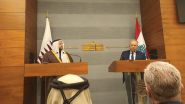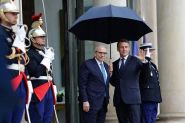
In a televised speech on Friday, his first since the fall of the Assad regime in Damascus, Hezbollah’s Secretary-General Naim Qassem acknowledged that “Hezbollah has lost its military supply route through Syria,” but emphasized that this loss was merely a minor detail and that a new supply route would be established.
Qassem further remarked, “The Syrian regime fell at the hands of new forces that we cannot judge until they stabilize, take clear positions, and organize their affairs.” Without referencing his long-time ally Bashar al-Assad, Qassem asserted that “the Syrian people have the right to choose their government, constitution and political options.”
In the same speech, Qassem reiterated his claim of Hezbollah's “victory” over Israel, stating that “Israel did not achieve its objectives in its aggression against Lebanon,” and that it sought a ceasefire after realizing that its confrontation with Hezbollah’s “resistance” was futile. He asserted that Hezbollah was “recovering from its wounds,” reaffirmed that “the resistance will persist,” and declared that without Hezbollah’s military prowess, “Israel would have taken Beirut.”
Hezbollah: a key player in Lebanon
Despite internal and political losses, Qassem portrayed Hezbollah as a crucial actor in the Lebanese political landscape. He also emphasized that “the recent Israeli aggression against Lebanon was unrelated to supporting Gaza, but was instead part of Israel’s broader expansionist project.”
Reiterating the now outdated slogan “Army, People, Resistance,” Qassem outlined his plans for the immediate future, which include “implementing the agreement in South Litani, reconstruction, the election of a president (scheduled for January 9, 2025), and engaging in positive dialogue on controversial issues, including the position on the occupation and how to confront it, as well as strengthening the Lebanese Army.”
On the matter of the ceasefire agreement, Qassem clarified the position of Hezbollah, stating that, in his view, the agreement only prohibits the presence of weapons and fighters south of the Litani River and not throughout Lebanon. “This agreement aims to stop the aggression, not to end the resistance,” he added. “It falls within the framework of UN Security Council Resolution 1701 and has nothing to do with Lebanon’s internal affairs, or with the relationships between the resistance, the state and the army, or with the question of armament.”
New developments at the southern front
Parallel to Qassem’s speech, new developments occurred along Lebanon’s southern front. An Israeli drone targeted a car on the Khardali road, killing Mohsen Sharaf al-Din, a merchant from Nabatieh, who was en route to his money transfer business in Jdeidet Marjayoun. Later, some local media reported that Sharaf al-Din had close ties with the pro-Iranian armed group.
Later in the afternoon, a pickup truck carrying three individuals crossed the barbed wire fence toward the al-Majidiyah plain, abducting a shepherd, Abdou Abdul-Aal, who was subsequently taken across the Israeli-Lebanese border.
Additionally, it was reported that the Israeli military destroyed several homes between the areas of Tayr Harfa and Jebbayn in the Tyre district.
This morning, explosions and gunfire from medium and light machine guns were reported in the towns of Mays al-Jabal and Kfar Kila, south of Lebanon. A particularly loud explosion was heard, accompanied by thick columns of smoke rising from the region.
Reconstruction and demining operations
On the other hand, Brigadier General Youssef Haydar, the head of the Lebanese Army's Works Regiment, and Brigadier General Joseph Mazraani, the head of the third operations section of the seventh brigade, visited Khiam to oversee reconstruction efforts and the reopening of main and secondary roads in preparation for the return of its residents. Lebanese Army bulldozers continued their work today, clearing roads around the Khiam Detention Center and the adjacent mountainous areas.
The Lebanese Army also continued its surveying and inspection operations in the southern regions affected by the conflict, particularly in the villages of the Tyre district. Engineering teams have been detonating unexploded ordnance, including rocket shells and cluster bombs left over from Israeli attacks, notably in the areas of Qlaileh, al-Mansouri, al-Haniya, and al-Amiriya in the western South Tyre sector.
The efforts to rebuild southern Lebanon are therefore ongoing, with the focus on both restoring infrastructure and ensuring the security of the territory through the deployment of the Lebanese Army in a still-tense military environment.



Comments